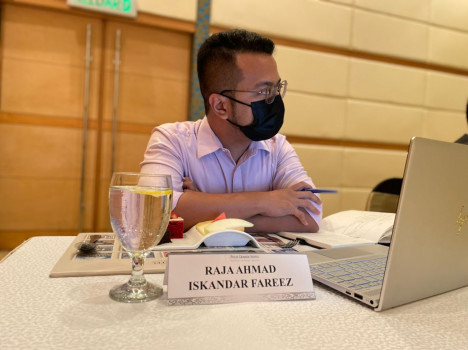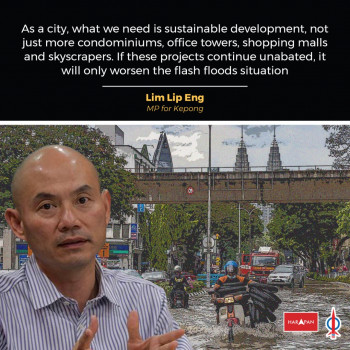by Liew Chin Tong
The funeral rites for Karpal Singh ended with family members scattering his ashes in the sea, off Green Hall in Penang, but the national soul-searching to understand and commemorate the statesman’s legacy has just begun.
Karpal was a political and legal giant who was looked up to by two generations. His commitment to the principles of justice spoke volumes and will continue to be a bedrock of inspiration for generations to come. He showed us that the power of justice is the antidote against the forces of chaos.
For over 40 years, he and Lim Kit Siang made a formidable duo who fought tirelessly against an oppressive regime. They represented justice, they represented resistance in the face of tyranny, they represented our hopes for a better Malaysia.
Karpal’s legacy as a human rights lawyer, a staunch defender of constitutional democracy, and his leadership in the Democratic Action Party will be remembered, studied, and perhaps critiqued.
Telling the Tiger’s life story
One day in December 2010 at Parliament, Karpal asked me to meet him at his Pudu office. As I arrived at Karpal’s library, a New Zealander journalist Tim Donoghue joined our meeting. Karpal and Tim asked me for publishing advice as my team published a photo book of Karpal in three languages to mark his 70th birthday in June 2010.
Tim met Karpal in 1987 when Karpal acted for New Zealanders Loraine Cohen and Aaron Cohen in a drug-related death penalty case and saved them from the hangman’s noose. Karpal was already a well-known international name after the failed attempt to save Australians Kevin Barlow and Geoffrey Chambers who were hanged in 1986.
Tim was commissioned to write a biography on Karpal, he would spend the next 25 years writing it before the book was finally launched on September 2013. The intervening years saw the ups and downs of Karpal’s life.
Karpal was detained under the Internal Security Act in 1987-1989. In the 1995 general election he scraped through and was reelected in Jelutong with the slimmest of margins.
In 1999, both Karpal and Kit Siang were not returned to Parliament for the first time in their respective political careers.
Both Karpal and Kit Siang were re-elected to Parliament in the March 2004 general election but Karpal was paralysed from the waist-down by an accident in January 2005.
His legacy
Karpal’s international reputation comes from his legal human rights work against the death penalty and other cruel punishments like judicial caning. Domestically, it was his steadfast belief in a constitutional democracy that earned his the respect of friends and foes.
In November 2013, Rasah MP Teo Kok Seong and I went to discuss some political matters with Karpal. We spent an hour listening to his legal adventures about saving lives from the death penalty. Many of these stories were recorded in Tim’s book. I asked Karpal whether he knew how many lives he saved. He said “a couple of dozens”. I vaguely heard that there exists a “Karpal’s list of survivors” somewhere and if there is none one should be compiled.
During a Perlis Ubah truck ceramah in November 2012, while Karpal was speaking, a man walked up to me and asked for opportunity to thank Karpal as he was one of those saved by Karpal.
To represent death row inmates – souls at the bottom pit of society – and to crack his wits to save them reflects the inherent humanism of this man that should continue to inspire.
In June 2011, through the help of the then Law Minister Nazri Aziz, Gobind and I managed to organise a parliamentary roundtable, which resolved to call for a moratorium on executions, pending for a thorough review of the death penalty. It is for us to continue the human rights legacy of Karpal and to be guided by his deep humanism.
Much had been said about Karpal’s opposition to hudud laws. But those who highlighted Karpal’s concern for hudud should also note that the opposition to hudud stems from his steadfast belief in Malaysia as a constitutional democracy.
I had several fairly long private discussions with him about hudud and political Islam.
From my conversations with Karpal, It was evident that he is fully aware that while his statements on hudud is often misconstrued as anti-Islam, he was seeing it from a constitutional point of view: that hudud is not constitutional.
In the same light, his comments on the roles of monarchs should be read in the same context. Karpal’s various run-ins with the royals throughout the past three decades should not be misconstrued as anti-Malay but as one who attempt to ensure that everyone – the royals included – follows the laws in a constitutional democracy.
Leading the DAP
For Malaysians, Karpal is best known as a top DAP leader for decades. Karpal became national chairman of DAP (replacing Lim Kit Siang) in September 2004 when Lim Guan Eng was elected the Secretary-General. While the chairman is not the number one post in DAP, Karpal brought his stature to the position.
In the period post-2008 general election when DAP first tasted some form of state executive power, Karpal was keen to ensure that the party lived up to the expectation of the public.
Karpal was no shy of controversies during his decade-long chairmanship. I must confess that as a DAP leader, occasionally I felt unease with the Karpal’s choice of language and sometime his timing, especially when it came to party matters and issues relating to coalition building. But his mission to uphold the integrity of the party is crystal clear and well understood.
Karpal Singh is a legend, a courageous soul who feared no one and who stood up for the downtrodden, dispossessed and destitute. The legend lives on despite the death. In his lifetime, I would say he has inspired and given hope to at least two generations. His legacies and the power of justice will continue to inspire many more generations. -The Rocket
* A similar version of this article first appeared in the May issue of Penang Monthly



